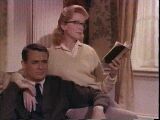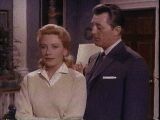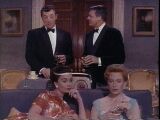The Grass Is Greener
1960 US
Dir: Stanley Donen
Str: Cary Grant, Deborah Kerr, Robert Mitchum,
Jean Simmons



Sometimes, I, as a Japanese, wonder how British people and
American people feel each other.
As I am a Japanese, I sometimes wonder how British people and American people
feel each other. Please don't say that it is none of my business. After all, I am a very nosy fellow. Obviously,
they are speaking the same language; that is, of course, English, which I've been trying to master with years after
years of practices, but still can't grasp entirely. According to many eminent linguists such as F. Saussure or
B. L. Warf, a considerable amount of people's way of thinking is molded by their own mother language. But, both
Americans and Britishes are speaking the same one. So, I'm very curious about this subject. "The Grass Is
Greener" is one of those by which, I assume, we can get several ideas about this subject, even if the ideas
shown might be just stereotyped ones. "Stereotyped" doesn't necessarily mean they are worthless, for
the mechanism of producing stereotyped views might be also molded by a particular culture and language, though,
in this movie's case, language is irrelevant due to the fact that they are speaking the same one.
Cary Grant, as an Englishman, and Robert Mitchum, as an American
vie for Deborah Kerr's attention. Do you want to join them? Please
don't if you don't want to put your life into jeorpady. Because,
astonishingly they duel with pistols.
In this movie, Cary Grant and Deborah Kerr (As you might know well, they are
actually British actors) play a British married couple who owns a vast mansion in England, where occasionary tourists
walk around all over it. They seem to be living a life of a kind of aristocrat's pedigree. But, as the aristocracy
has long been gone, their status might not be so good as it seems to be, even though they can afford to hire a
classy butler. As a proof of this, Kerr is growing mashrooms. One day, among those tourists, especially inquisitive
one enters into a private domain by pushing aside the sign hung on the entrance of the room notifying the room
is private. He is an American, and a millionaire (played by Robert Mitchum, of course, actually he is an American).
As you might expect rather easily, Mitchum and Kerr are instantly attracted to each other. So, they begin to exchange
harmless conversations usually preceding serious involvement. But, of course, as her husband is also living in
the same mansion, there is no wonder he comes into the room while Kerr and Mitchum are making an intimate conversation,
and instantly notices what's going on there. Although Mitchum leaves the mansion soon after that, Mitchum and Kerr
meet again in London. After this meeting, usual traiangular relationship ensues. But, in this movie's case, it's
not traiangular, but square. Because there is another girl (played by Jean Simmons) who is a friend of Kerr's,
and, at the same time, seems to have long been falling for Grant who, in turn, seems to hold not so much enthusiasm
for Simmons (Oh! poor Simmons). Anyway, after having made several obligatory banterings and deceivings, Grant and
Mitchum decide to make a duel using pistols to decide which one should get Kerr, and actually practice it. However,
as you might easily guess, both have no intention of killing the other (After all, this movie is a comedy. If one
of them were actually killed, it wouldn't be a comedy at all.), so, knowing Mitchum has no intention of actually
shooting at him, Grant decides to make a trick and get on his arm a bullet which has been shot by his butler who
was ordered in advance by Grant to do so. Finally, Grant succeeds in getting back his wife, the reason of which,
Mitchum so guesses, would be because his wounded state has succeeded in eliciting her compassion. Mitchum, therefore,
leaves the mansion with Simmons, which, I dare say, is rather a predictable result. Even I consider the presence
of Simmons might be mainly for this last scene, for, Mitchum might have been a complete loser had it not been for
her presence, which wouldn't have been so much a confortable scene to watch for this kind of comedies.
Cary Grant's tendency of leaving everything obscure seems to be
making the situation even worse for him.
Of course, I know it would be an exaggeration if I said that the movie's intention
would be to explicate differences between an American culture and a British one. Even so, at least, it seems to
be one element of comedic ingredients of the movie. However, as I am a Japanese, sometimes it is rather difficult
to grasp subtle nuances arising from the differences between them. For example, in a scene, when Jean Simmons tries
to remember what Cary Grant said in the previous night, she says "He said, it is high time England had a Statue
of Liberty of her own". Soon she notices something, and rephrase it as "Or, he said, Libertine?".
Then, Deborah Kerr respond to it without any delay by saying "dreary, pompous Englishmen". It's very
difficult for me to understand such a subtle level of a difference, even though, for those who are living either
in the United States or in England, it might not be subtle at all. Probably, there must be other examples of this
kind of allusions concerning the differences between these two countries that I couldn't so far even notice. Anyway,
I presume it wouldn't be so wrong if I said that usually Englishmen are regarded as rather pompous people by Americans
as described above. In another scene, Kerr says that, when a man tells a married woman she is lovely, Frenchmen
never hesitate to say it, and Americans hesitate before they say it, but Englishmen tell the husband of that woman
first, because they know the husband will surely tell it to his wife. What is funny in this statement is the premise
that Englishmen take it for granted that husbands would obligatorily tell their wives about every last bit of information
even if it, considering a given situation, needn't be mentioned at all. In this movie, the depiction of pompousness
of Englishmen culminates in the aforementioned scene where Cary Grant offers such an anachronistic proposition
to Robert Mitchum as they ought to duel with pistols in order to determine which one should get Kerr. As Mitcum
is saying in that scene, dueling is not only unconventional, but also unheard of in the 20th century. Nevertheless,
they practice it. This scene is funny because they actually practice it in spite of the fact that they both know
it's absurd, but Grant thinks there is no other way out of the situation, though, as I said before, he has a plan
to deceive Mitchum. In other words, Grant's pompousness and inflexibility never allow him to just say "No!"
to Mitchum. If he said so, it could solve the problem, I presume. For, after all, he is the one who married to
her. Saying in one word, his tendency of leaving everything obscure, which is proved in the scene with Simmons
where when Simmons tells him he should talk the whole thing over with his wife, he answers to it by saying the
spoken word is like a lost opportunity and ruin everything, is making the situation even worse for him. Notwithstanding
this, probably since The Grass Is Greener is a comedy, finally he gets her back even if it is due to Kerr's
willpower and, therefore, not by the one of his own. So, I boldly guess he couldn't have got her back at all had
the movie not been a comedy.
The primary aim of this movie isn't to make a character study for
each indivisual concerned, but to create comedic scenes out of
stereotyped views toward those two cultures.
Compared to Cary Grant, Robert Mitchum is depicted as a straightforward American
guy, even though American guys should hesitate one moment to say something flattering to women. After all, he is
such kind of person whose curiosity drives him to trespass other person's private domain by pretending an innocent.
Moreover, he is hanging a camera around his neck (Oh! Isn't this Westerner's stereotyped image for Japanese tourists?).
It should be noticed that a camera is a very obtrusive equipment, a kind of intruder. Because, it always catch
something, something belonging to other persons. As a matter of fact, he shoots Kerr with his camera. Thus, it
wouldn't be an exaggeration if I said in such a way that the camera around his neck would certainly symbolize his
aggresiveness and straightfowardness. As he says in a scene, he obviously believes cameras never lie. Even he asks
her to marry him extremely straightfowardedly, which is quite an opposite attitude to Grant's. So, the question
is whether Mitchum will be able to succeed in acquiring her with his aggresiveness and straightforwardness. The
answer is, according to the movie, he won't. But, I should say this answer shouldn't be stressed so loudly, for
the movie is a comedy, and, therefore, the primary aim of it isn't to make a character study for each indivisual
person concerned, but to create comedic scenes out of stereotyped views toward those two cultures. Though I'm not
sure this movie is consiously making fun of stereotyped notions usually associated with the issue of cultural differences
between an American culture and a British one, nevertheless it's fun to watch those eminent players playing characters
strongly motivated by such stereotyped schemes. Besides, as I said in the first paragraph, the mechanism of producing
stereotyped views might be also molded by a particular culture. Moreover, I, as a Japanese, can surely know in
this way at least what they are thinking about each other in the stereotyped way. It's not just an accident that
Mitchum and Kerr refers to each other as perfectly typecasting, for "The Grass Is Greener" is
about typecatings that have been being created by cultures of their own for so many years.
It might have been very difficult to make such a comedy movie as
most of whose scenes takes place in a very limited space.
Another thing I want to say concerning this movie is that it might have been
very difficult to make such a comedy movie as most of whose scenes takes place in a very limited space (most of
scenes of "The Grass Is Greener" takes place in a mansion). I guess such kind of comedy movie would be
far more difficult to make than to make such kind of intense drama movies as most of whose scenes takes place in
a limited space, such as "12 angry men"(1957) or "Cat on a Hot Tin Roof"(1958). Because, without
the presence of intensity; in other words suspense elements or altaration of situations, it would be very difficult
to keep the audience sit tight for long time. This same thing could be applied to, for example, many of the movies
based upon Neil Simon's plays. This kind of movies must get their own strength mainly from carefully constructed
conversations, for there aren't so many other sources they can draw on. You may consider the fact that three of
the movies based upon Neil Simon's plays are constructed rather like omnibus movies, though they aren't exactly
omnibus movies; that is, "Plaza Suite"(1971), "Last of the Red Hot Lovers"(1972), and "California
Suite"(1978). This fact might be suggesting that it's difficult to make a 2-hours movie out of these
materials, though I'm not sure original plays are, likewise, structured like omnibus movies. I assume "The
Odd Couple"(1968) is rather successful one, and also "Barefoot in the Park"(1967). I also like these
two movies, even if we should take into account overdosing use of so-called one liners. Likewise, I'm thinking
"The Grass Is Greener" is a good example (but not the best one either) of this kind of movies even though
there are many awkard dialogs such as the story of Beauler and Angela told by Deborah Kerr, and many reviewers
regard this one as another Stanley Donen's insipid comedy movie. I've never been bored of this movie, though so
far I've watched it more than 10 times. To tell the truth, I somewhat feel I must admit that the reason why I like
this kind of conversation oriented movies might be more or less affected by the fact that I am a Japanese, for
I might feel fresh for what wouldn't be fresh at all from the eyes of native English speakers. But, anyway, besides
all of what I've mentioned, I consider still the movie is worth watching. Because, it's certainly fun to watch
those four eminent actors and actresses acting together joyfully.





